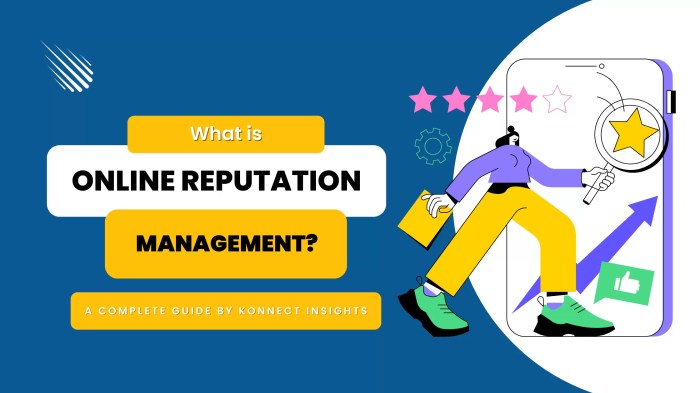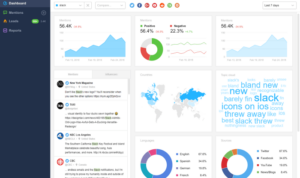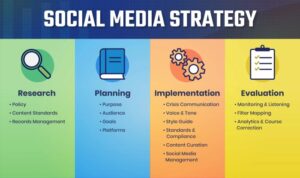Online Reputation Management is not just a buzzword; it’s a critical aspect of personal and business success in today’s digital world. From shaping perceptions to influencing decisions, your online reputation can make or break you. Let’s dive into the strategies and tools you need to navigate this ever-evolving landscape.
Importance of Online Reputation Management
Maintaining a positive online reputation is crucial in today’s digital age, where information spreads rapidly and is readily accessible to anyone with an internet connection. Whether it’s an individual or a business, online reputation management plays a vital role in shaping perceptions and influencing decisions.
Impact of Online Reputation, Online Reputation Management
- A positive online reputation can attract customers, clients, and opportunities, leading to increased credibility and trust.
- Conversely, a negative online reputation can deter potential customers, clients, and partners, resulting in loss of business and damage to brand image.
- Online reviews and social media posts can significantly impact reputation, as they are often the first things people see when researching an individual or a company.
Strategies for Effective Online Reputation Management

In the digital age, maintaining a positive online reputation is crucial for businesses and individuals alike. Implementing proactive strategies and effectively managing online mentions and reviews can make a significant impact on how you are perceived in the online world.
Proactive Measures to Build and Maintain a Positive Online Reputation
- Establish a strong online presence across various platforms, including social media, review sites, and industry-specific forums.
- Create high-quality content that showcases your expertise, values, and commitment to customer satisfaction.
- Engage with your audience regularly by responding to comments, messages, and reviews in a timely and professional manner.
- Monitor your online reputation consistently to stay informed about what people are saying about your brand or personal brand.
Significance of Monitoring Online Mentions and Reviews
- Monitoring online mentions and reviews allows you to proactively address any negative feedback or reputation attacks before they escalate.
- By staying informed about what is being said about you online, you can identify areas for improvement and take corrective actions swiftly.
- Positive reviews and mentions can also be leveraged to enhance your online reputation and attract new customers or opportunities.
Ways to Address and Manage Negative Feedback or Reputation Attacks
- Respond to negative feedback calmly and professionally, acknowledging the issue and offering a solution or explanation.
- Take the conversation offline when necessary to resolve the issue privately and prevent further escalation.
- Implement a crisis communication plan to effectively manage reputation attacks and minimize the impact on your brand.
- Seek the assistance of online reputation management professionals if the situation requires expert intervention.
Tools and Platforms for Online Reputation Management
In the ever-evolving digital landscape, it is crucial for businesses to actively monitor and manage their online reputation. This involves utilizing various tools and platforms to stay on top of what is being said about their brand online.
Popular Tools and Platforms
- Google Alerts: A free tool that allows users to monitor mentions of their brand across the web.
- Brandwatch: A comprehensive social listening tool that provides real-time insights into brand mentions and sentiment.
- Reputology: A platform specifically designed for monitoring and managing online reviews across multiple review sites.
- Hootsuite: Known for its social media management capabilities, Hootsuite also offers monitoring tools to track brand mentions.
Comparing Features
- Google Alerts is a basic tool ideal for small businesses with limited budgets, while Brandwatch offers advanced analytics for larger enterprises.
- Reputology specializes in review monitoring, making it a valuable tool for businesses in the hospitality and service industries.
- Hootsuite’s strength lies in social media management, making it a great all-in-one solution for businesses looking to streamline their online presence.
Tips for Selecting the Right Tool
- Consider your specific needs: Choose a tool that aligns with your goals and objectives for online reputation management.
- Assess your budget: Determine how much you are willing to invest in a tool and choose one that offers the best value for your money.
- Read reviews and testimonials: Look for feedback from other users to understand the strengths and weaknesses of each tool before making a decision.
Case Studies on Successful Online Reputation Management

Online reputation management is crucial for businesses and individuals in today’s digital age. Let’s explore some real-life examples of successful online reputation management strategies that have made a significant impact.
Case Study: Starbucks
- Starbucks, a global coffee chain, faced a crisis when a video went viral showing an incident of racial bias in one of their stores.
- They immediately issued a public apology, took responsibility for the incident, and announced a plan to conduct unconscious bias training for all employees.
- Starbucks actively engaged with customers on social media, responding to comments and addressing concerns promptly.
- As a result, Starbucks was able to salvage its reputation, rebuild trust with customers, and demonstrate a commitment to diversity and inclusion.
Case Study: Tesla
- Tesla, an electric car manufacturer, faced challenges with negative reviews and customer complaints about product quality and service issues.
- CEO Elon Musk personally responded to customer complaints on social media, offering solutions and showcasing Tesla’s dedication to customer satisfaction.
- Tesla also implemented a proactive approach by sharing customer success stories and highlighting product innovations to counter negative publicity.
- Through transparent communication and a focus on customer engagement, Tesla was able to enhance its online reputation and strengthen brand loyalty.
Key Takeaways
- Transparency and accountability are essential in online reputation management.
- Swift and sincere responses to crisis situations can help mitigate damage to reputation.
- Engaging with customers on social media and addressing their concerns can build trust and loyalty.
- Proactively sharing positive stories and showcasing brand values can counter negative publicity effectively.





